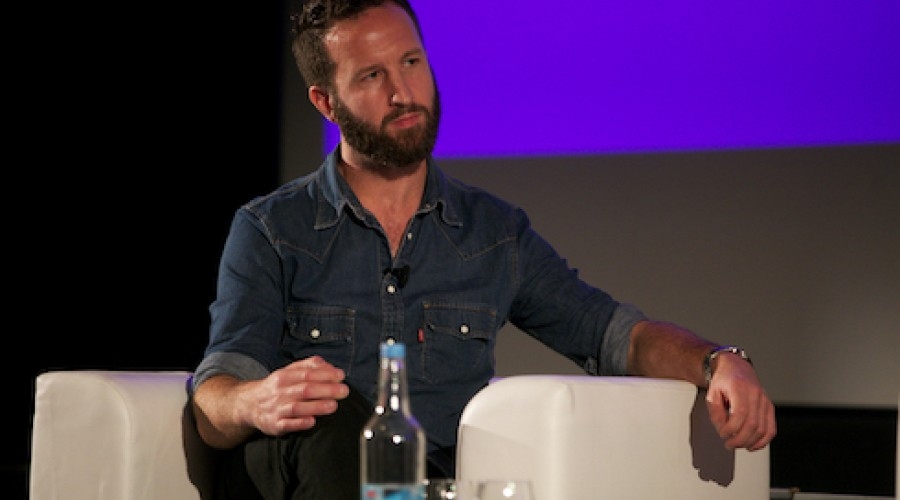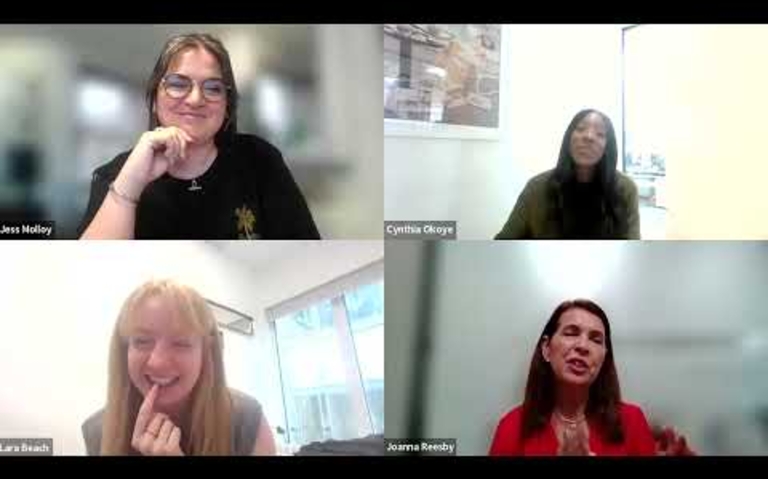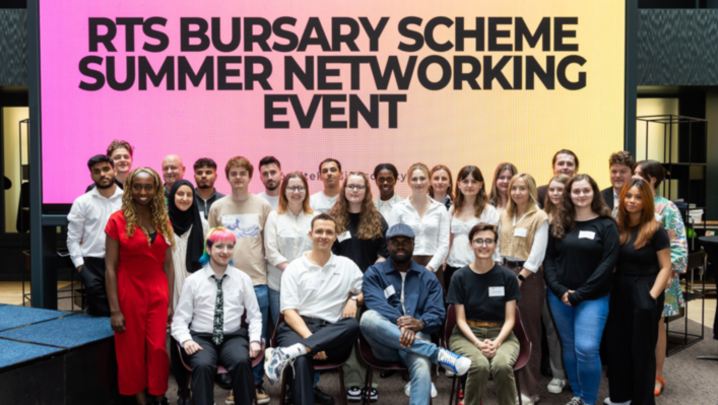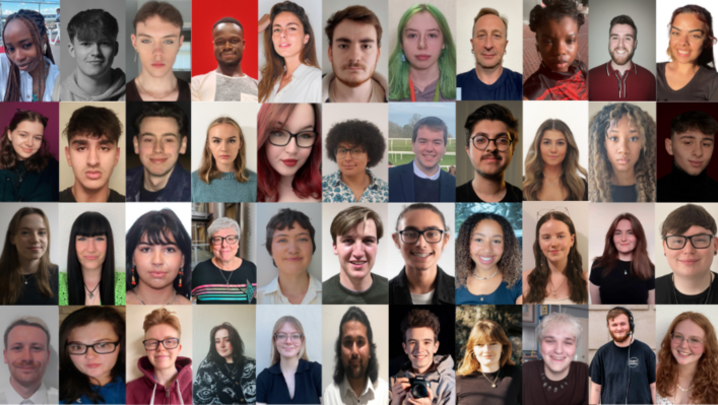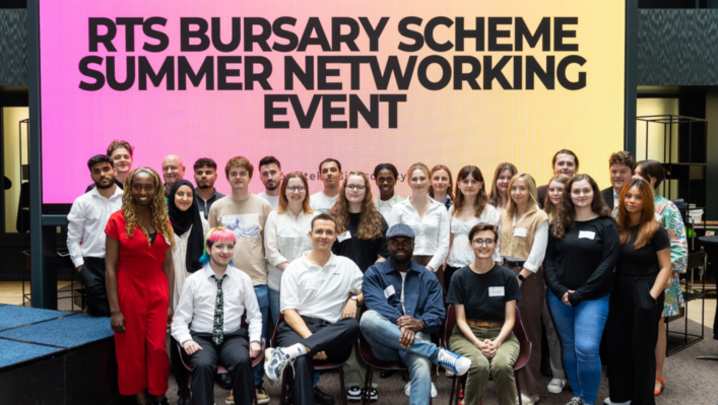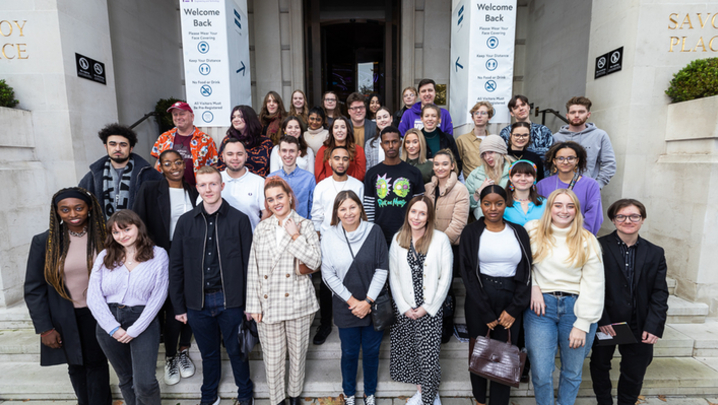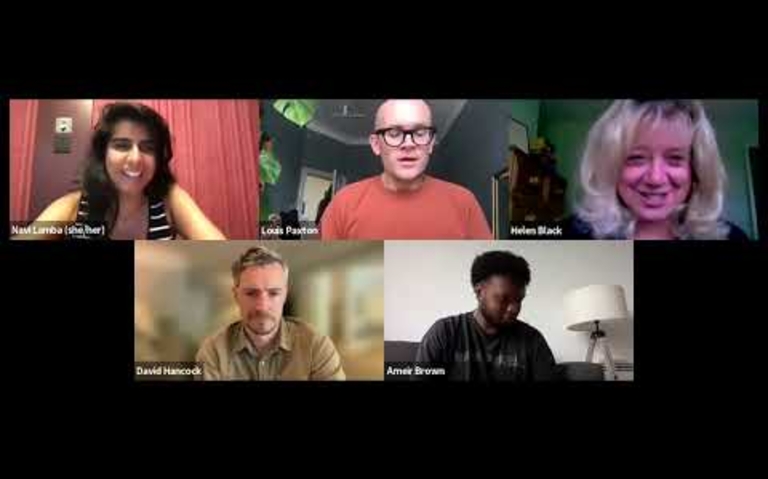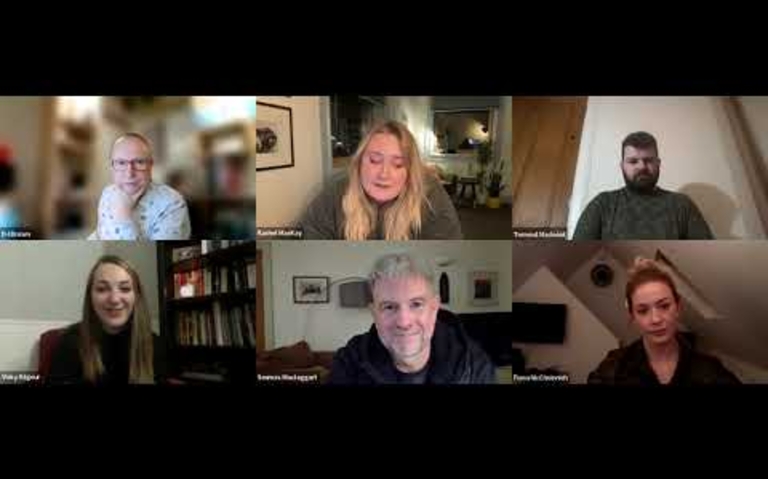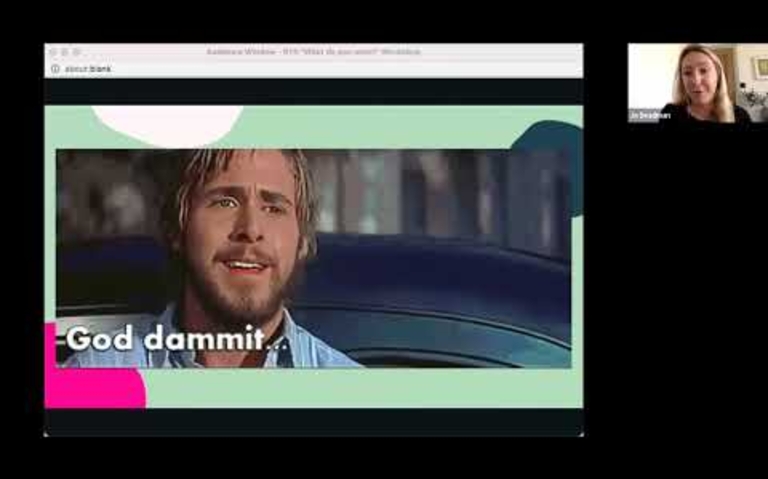Morgan Matthews has taken his camera in to places that most directors shy away from; into lives torn apart by mental illness, bereavement and addiction.
There is, however, another side to the award-winning documentary film-maker; one that delights in the quirky worlds of pigeon fanciers, Elvis impersonators and teenage maths prodigies.
His films, said the chair of the documentary student masterclass, Ruth Pitt, revealed “the extraordinary in the ordinary and the ordinary in the extraordinary.”
In a fascinating discussion, liberally sprinkled with clips from his work, Matthews talked about the art of documentary film-making.
Pitt, an experienced documentary producer herself, suggested that his parents’ jobs – his mother was a community worker for single parents; his stepfather worked with kids excluded from school – must have informed the subject matter of many of his documentaries.
“I was always interested in people going through tumultuous, interesting, extraordinary times,” said Matthews. “Now in retrospect I can see that [my parents’ work] had an influence.”
From an early age he was aware of the “potential social impact of documentaries”, having been moved by Paul Hamann’s Grierson award-winning 1987 BBC documentary, Fourteen Days in May, which follows a prisoner on death row in the States in the lead up to his execution.
A degree in film at the (then) London College of Printing followed A levels that included photography. “That [had been] my main interest but I realised that I wanted people to tell their own stories rather than the images,” he said.
While studying for his degree, Matthews gained unpaid work in TV production. “I got a credit as a researcher on a 1996 Secret Lives doc about [disgraced Liberal politician] Jeremy Thorpe and a Cutting Edge doc made by Madonna Benjamin.
“When I came out from my course I already had connections and experience,” he recalled.
A two-week job at Lion Television working on a pilot for BBC One docu-soap series Paddington Green was followed by work for Century Films making Care House for BBC4, a series about adults with learning difficulties in a York care home. “[Commissioner] Richard Klein took a punt on me and the films that I wanted to make and gave me the space to make them,” said Matthews.
Another examination of mental illness followed in Channel 4’s 2004 two-parter, My Crazy Parents. A harrowing clip played at the masterclass showed a distraught Scottish woman self-harming after her children had been taken into care
Matthews’ career; however, has been marked by sudden switches from hard-hitting to lighter films such as Taxidermy: Stuff the World, a 90-minute BBC Two documentary in 2005. “I had a childhood interest in natural history,” he recalled. “I understood their love [of nature] – it wasn’t macabre thing. For most taxidermists, especially European ones –the Americans are quite different [and into] trophy hunting – it’s about the preservation of beauty. The animals had died from natural causes.”
Matthews argued, however, that Taxidermy: Stuff the World was not a straightforward film. “Although there is light in this film, there is also quite a lot of shade. Equally, with subjects that have been on the surface quite heavy, I have always looked for lightness or it occurs naturally,” he said. “I’ve made films about grief, death, all sorts, and they are rarely incessantly bleak.”
Matthews found his feet at Century. “I made films that I felt were my own as opposed to being within the structure of a big series with an established format and style,” he said.
At the indie, he shot a number of long-form docs, including My Crazy Family, Taxidermy: Stuff the World and Quittersfor BBC Four, which followed a group of residents from a drug rehabilitation centre struggling to overcome their addictions.
“They allowed me to explore subjects in greater depth. There’s a different kind of arc to a 90-minute film. For me it’s a more natural [length]. With the way that I shoot and the time that I often spend on a subject, it feels like a more natural shape for a film.”
After moving to Blast! Films, other “lighter” films followed, including the 2007 BBC Two films: Million Dollar Pigeon on the world’s most lucrative pigeon race; Blue Suede Jew about an Israeli Elvis impersonator; and Beautiful Young Minds following the teen prodigies training for the International Mathematical Olympiad.
A year earlier, Matthews had set up his own production company, Minnow Films. Did he want to take charge? asked Pitt. “It wasn’t really about control,” he replied. “I was already lucky enough to be making films in a way that I was happy with – I had the freedom to do that.
“I was operating more and more independently. Although I had executive producers, they were not particularly hands on. It felt that I was making films out of other companies, but I could be doing that out of my own.
“I also see Minnow as a place to house great film-makers, whether they are established or new talent coming through – and also a nice place to work. We really care about the films that we make and I hope that people see the integrity in those films. I never set it up with the intention of it being a business.”
One of Minnow’s first films was 2008’s three-hour single doc for BBC Two, The Fallen, which scooped multiple prizes including the RTS best documentary award.
“The idea was to document every single British serviceperson who had died in the Iraq and Afghanistan wars,” Matthews recalled.
“I felt that those wars were getting further and further back in the news agenda. Every time there was the death of a soldier there was a tiny piece about it; a little picture and then a few generic words underneath. We were becoming disconnected from the reality of this loss.”
Scenes from a Teenage Killing, a two-hour doc for BBC Four which won a Bafta for best single doc, followed in 2011 and mined a similar seam. Filmed over an 18-month period, it examined “every violent death of a teenager in the UK” in a single year, 2009.
Matthews took issue with the newspaper reports of the murders. “Often the words ‘gang violence’ were mentioned but [lives were] not being explored, particularly if it was a young black teenager. The generic reporting of those deaths made me want to look into them in more detail. What we found was that hardly any of these deaths were gang related,” he recalled.
In 2014’s Shooting Bigfoot for BBC Four’s Storyville strand Matthews added more eccentrics to his gallery of subjects. This time he followed three Americans hunting for proof of the elusive ape-like creature known as Bigfoot. “This is a film about truth and our perceptions of what truth is and people who create their own truth – if they believe in something enough, it sort of becomes true,” he said.
Matthew’ most recent project, however, marked a departure – into fiction, although feature film X+Y has its roots in his doc, Beautiful Young Minds. It follows a teenager, Nathan – played by Asa Butterfield, who had the lead role in Martin Scorsese’s Hugo – on his journey to the maths Olympiad.
Sally Hawkins, Rafe Spall and Eddie Marsan also starred in the film, which was warmly received by critics. Matthews, though, remains at heart a documentary film-maker.
“I was bringing a lot from my documentary background into the way that we shot this feature film,” he said. “It was very much inspired by the documentary and a lot of what is in the feature film did happen.”
Morgan Matthews fielding questions and offering advice
How many cameras do you use when shooting?
Morgan Matthews: “My films are self-shot – it’s just me and a camera … I would always advise and hope to work with a producer as well. Most of the films I’ve done have been [as part of a] a two-person team, working with a great producer who has also often done the sound.”
To what extent do you direct your films?
MM: “There’s always directing going on … in terms of my shot choices, the questions I decide to ask and the timing of them, and the relationship I’ve developed [with the subject]… but at no time am I saying, ‘Can you hold your hand up and show me that cut on your wrist.’ That [scene from My Crazy Parents of a woman cutting herself] was as it unfolded.”
Do you enjoy the editing process and can it change your view of the film you’ve shot?
MM: “I love the edit … It’s such a creative process … It really is where you forge the film, particularly if you’ve made a film like me which is unscripted, and you have what you hope is strong material but you really don’t know how you’re going to fashion it. There are films I’ve made like The Fallen where we didn’t find the structure of that film until we were in the edit.”
What ethical processes do you go through when you make a film?
MM: “Every subject you approach has [ethical] issues. There is a commissioning editor and usually an executive [producer] and, between us, we work out what we’re comfortable with. But, for me, it’s also about what people in the film are comfortable with. I always show people my films before they go out … I don’t want to make a film that upsets people.”
It must be emotionally draining to make your type of films?
MM: “If you’re not affected, there’s probably something wrong … But if people want you to be there, which they do, and tell their story … then it feels like a positive thing to do. That process of talking to people, although emotional, can be cathartic for them.”
How can newcomers get noticed?
MM: “It depends at what stage they are at. It’s always interesting to see a graduation film, but they don’t have to have come from a film school or film degree background. There are lots of other skills we need and backgrounds that are appropriate to documentary film-makers.”
Does it help to suggest ideas?
MM: “Ideas are the currency of our business. I’ve always generally worked on my own ideas or ideas that have come from somewhere very close to me … But there are fantastic directors I know who don’t come up with their own ideas; companies or executive do and they go and work on that film. There are different ways of working.”
Should I make a taster tape?
MM: “Commissioners want to see a taster tape, a short film that you’ve put together with the people that you think are going to be in your film … If you have that and it’s good, you have a much better chance of getting a commission, With the films I make now, I still have to do that.”
By Matthew Bell.

